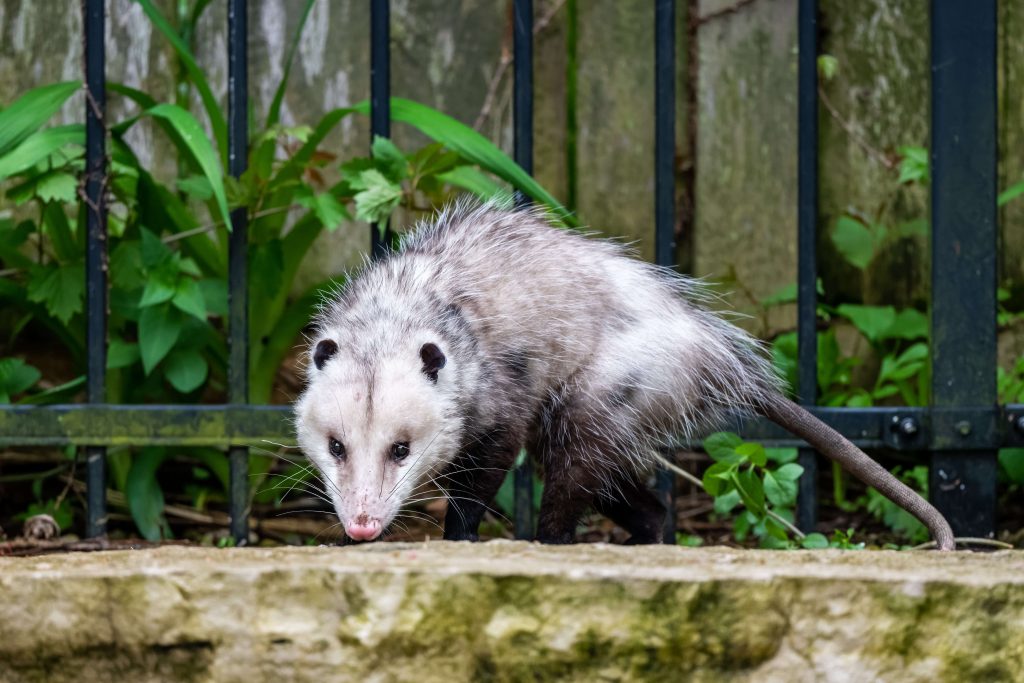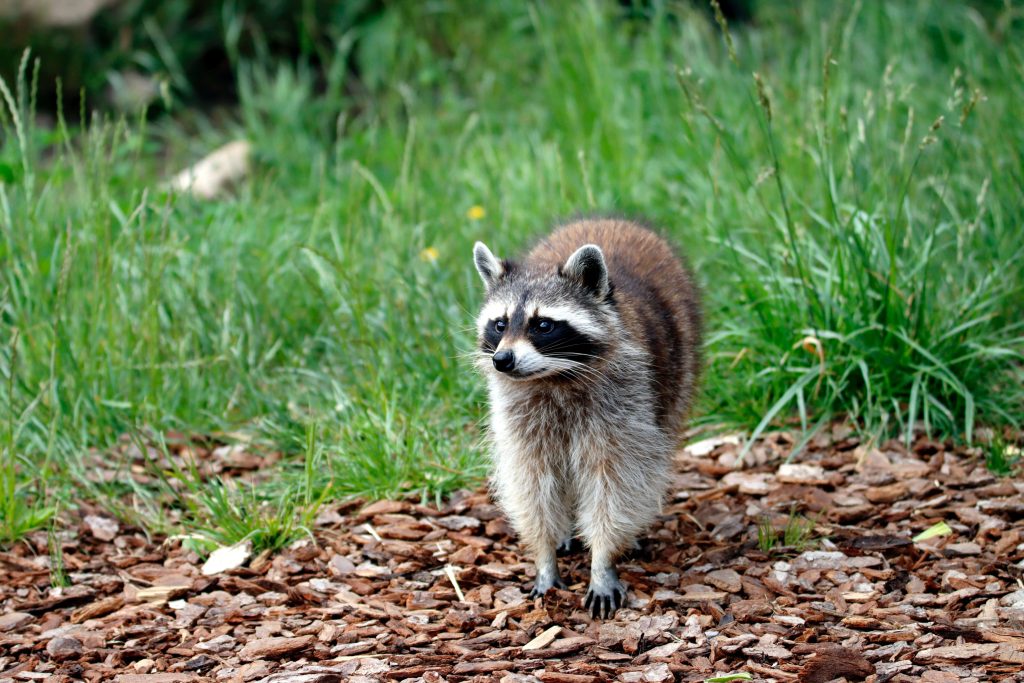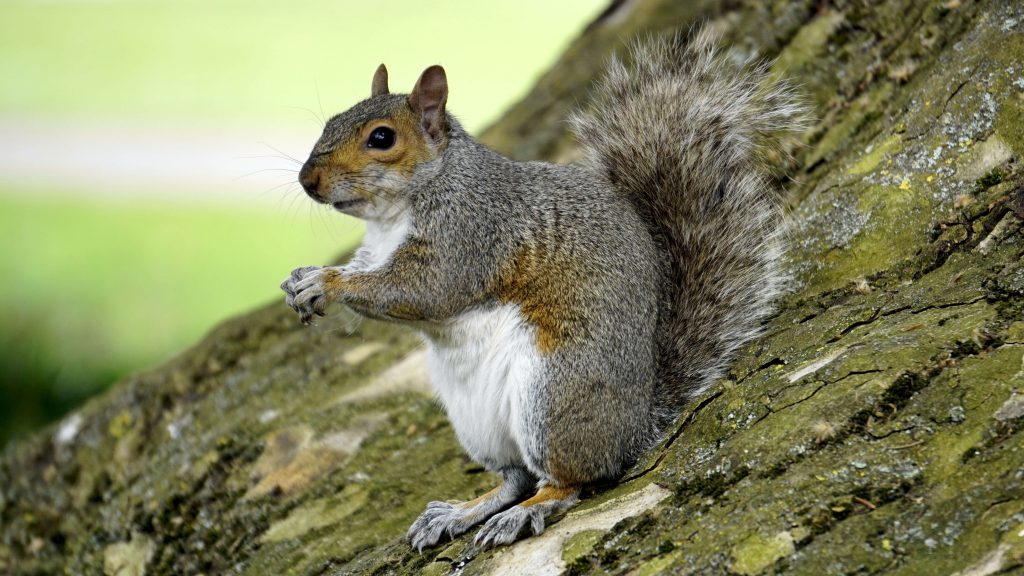Wild animals are very common in the Pacific Northwest. Unfortunately, some wildlife species are likely to be a nuisance to homeowners and property owners. They can even become aggressive. Let’s take a look at the most common Oregon pest wildlife – opossums, raccoons, and squirrels – their behavior, the threats they pose, and how to keep them away from your home and property.
Opossums
 Some people call them possums. Some people call them opossums. Some people think they are cute. Some people think they are scary. Here in Oregon, opossums are considered an invasive species. If you notice them living in your home, yard, or property, it’s important to learn more about opossum behavior – where they hang out, what they eat, whether or not they’re dangerous, and how to remove them from your home.
Some people call them possums. Some people call them opossums. Some people think they are cute. Some people think they are scary. Here in Oregon, opossums are considered an invasive species. If you notice them living in your home, yard, or property, it’s important to learn more about opossum behavior – where they hang out, what they eat, whether or not they’re dangerous, and how to remove them from your home.
Ten facts about opossums
- A common misconception about opossums is that they are rodents. In fact, opossums are marsupials – the only marsupial native to the U.S.! This means opossums have a pouch to nurse their babies.
- Opossums like to eat nuts, fruit, and grass, which means they are attracted to your garden. They also like food scraps, so they may try to get into your garbage. Also, they’ll eat rodents, insects, and chickens.
- Another common misconception about opossums is that they are blind. Opossums are not blind, they just see better at night, which means they are nocturnal. They look for food and shelter in the dark.
- Possums do not hibernate, and they live in the wild near water and in urban and suburban areas near people because they like our compost, food scraps and pet’s food. They don’t build their own homes, so they will make their home in your attic, garage, porch, stairs, or woodpiles.
- Opossums are usually not aggressive, but if they feel threatened, they may flash their 50 sharp teeth, growl or hiss at you.
- “Playing possum” is a phrase used to describe pretending to be asleep to avoid someone annoying or attacking you. This is based on real-life opossum behavior. They’ll play dead – sometimes up to six hours – to avoid potential confrontation. When they do this, their bodies go limp, drool, and smell of decay.
- Opossums are great at swimming and climbing, and they can make their way onto roofs and into homes, where they will chew and scratch on insulation, siding, gutters, and more.
- The average lifespan of an opossum is only one to two years.
- Good news! Opossums don’t transmit rabies, but they can spread fleas which is terrible news for your pets. And they can also transmit diseases, which is bad news for you and your family.
- Signs that you have opossums living in your home or on your property include damaged gardens, nests in trees, chewed-up insulation, air ducts, or drywall, musty odors, and food scraps.
How to get rid of opossums in your home and garden
Opossums are solitary animals, meaning they fly solo except during breeding season or when a female is carrying her young. An opossum’s search for food may lead it to your home or garden, so the best way to keep them out is to deter them by picking up fallen fruit, eliminating debris, and bringing pet food in at night.
Opossums pose very few threats to people, but they should still not be handled by homeowners. It’s recommended that you contact a local professional opossum trapping and removal company. Interstate Pest Management can safely and humanely remove opossums on your property and offer tips to help keep them from coming back.
Raccoons

Many people think raccoons are cute because of their bandit-like faces, and there are even social media accounts dedicated to raccoon memes! Just don’t forget that these clever, nocturnal mammals are nuisance pests, not pets. In fact, here in Oregon and Washington State, it is illegal to keep a raccoon as a pet. Learn more about raccoon behavior, including whether or not they’re dangerous, what they eat, where they live, and how to get rid of raccoons in your home and on your property.
Ten facts about raccoons
- Raccoons have made their homes in more urban areas because of a lack of predators and close proximity to food.
- Raccoons are adaptable creatures, and they can make their dens anywhere. In homes, raccoons live in attics, crawl spaces, and underneath porches. And unfortunately, they can cause damage to your home and property using their strong teeth and claws.
- There are two types of raccoons found in Oregon – one ringtail and the common raccoon.
- Raccoons do not hibernate, and they are active all year round.
- Raccoons are hungry animals! They eat snails, produce, birds, rabbits, and their own eggs. They’re notorious for eating pet food left on a porch or getting into garbage cans for food.
- You may think raccoons are dirty because they dive into dumpsters, but raccoons actually wash or clean their food before eating it.
- Raccoons can carry rabies. This makes them dangerous for you and your pets. Call your local animal control or police department if you notice a raccoon in the daytime wandering erratically, seeming oblivious, staggering, self-mutilating, or making high-pitched noises. Other signs include discharge from the eyes or mouth and wet and matted hair on their face.
- In addition to rabies, raccoons can spread infections and diseases through their fur, saliva, and waste.
- Raccoons can attack if they feel threatened. They have sharp teeth and sharp claws so an attack by a raccoon can be painful.
- Signs that you have raccoons living in your home or on your property include occasional raccoon sightings (they’re mainly active at night), messy or tipped-over garbage cans, food waste, missing pet food, broken vents, scratches near downspouts, raccoon droppings, and screaming or chirping sounds.
How to get rid of raccoons in your home and garden
Exclusion and trapping are the most effective ways to deter raccoons from entering your home and property. Cover attic vents and other openings around your home. Make sure trash cans are secured and pick up any fallen fruit and food left outside, including pet food. Consider rodent guards for any large fruit trees you have on your property.
If you have an active raccoon infestation, trapping and removal are recommended, and this shouldn’t be something you try yourself! Raccoons are unpredictable and may become aggressive, especially if their babies are nearby. Contact a licensed, local pest management company like Interstate Pest Management. We specialize in humane raccoon removal services for Portland, OR and Vancouver, WA homeowners. We can safely remove the raccoon(s) from your property, and identify vulnerabilities on your property that may lead to future infestations.
Squirrels

Squirrels have sweet faces and a lot of energy, and there have been some great fictional squirrel characters from cartoons, movies, and video games. But don’t forget, squirrels are pests! They are not dangerous or threatening like other wildlife pests, but when they get into your home, they can drive you nuts – pun intended! Learn more about squirrel behavior, including whether or not they’re dangerous, what they eat, where they live, and how to get rid of squirrels who have taken up residence in your home.
Ten facts about squirrels
- There’s a large squirrel population in the Pacific Northwest, including four native tree squirrel species: the western gray, Douglas, American red, and northern flying squirrels plus two nonnative invasive species: the Eastern gray squirrel and Eastern fox squirrel.
- Squirrels are rodents, meaning that they are cousins to other species of rodents such as rats and mice. The one thing that almost universally differentiates squirrels from rats in appearance is their large, bushy, and hairy tails.
- Like other rodents, squirrels can cause damage to your home and commercial buildings including gnawing on insulation, wood, ducts, and wiring – which can pose fire hazards.
- Most squirrels do not hibernate – however they may sleep through very cold days and forage on warm, sunny days.
- Squirrels often make their way into homes through the attic, but they can also get in through any small hole.
- Squirrels eat more than just nuts. They are omnivores feasting on seeds, fruits, and fungi plus plant buds, flowers, and tree bark. They also like meat such as insects (such as grasshoppers), bird eggs, hatchlings, mice, and lizards.
- Squirrels are not dangerous. They are shy animals, but if you attempt to remove a nest, they may bite and attack, especially if their young are present.
- While squirrels do not carry rabies, they are hosts to parasites, like fleas and ticks.
- Squirrel infestations and rat infestations show similar signs, including damage, droppings, and unpleasant odors. A licensed pest management professional can help tell the difference.
- Check for signs that you have squirrels living in your home including strange noises like scampering and scratching, unpleasant odors from waste, signs of gnawing or scratching, and squirrel droppings, which closely resemble rat droppings.
How to get rid of squirrels in your home and garden
Exclusion is the most effective way of preventing rodents like squirrels from entering your home and your garden. Cover attic vents and properly seal potential entry points into your house such as eaves and chimneys. Pick up any fallen fruit off the ground and keep bird feeders away from the home to keep squirrels away. Just remember, if you see signs of squirrels living in your home, do not seal up the holes. Squirrels will need to be removed before proper exclusion is carried out!
Don’t try to remove squirrels nesting in your home yourself. A local pest management company can help! Licensed professionals at Interstate Pest Management can humanely remove squirrels from your property and offer ways to help prevent future infestations. We also specialize in wild animal waste cleanup to get your home back to a clean and sanitized condition once the squirrels are gone.
Professional Wildlife Removal, Trapping, and Cleanup Services in Portland and Vancouver
When wild animals gain access to your property or your home, they can cause damage, spread diseases, and become aggressive. It’s important to work with a local licensed wildlife trapping and removal expert when dealing with wild animals. Learn more about fast and humane wildlife trapping and removal services provided by Interstate Pest Management. We also provide wild animal cleanup services to ensure your home is properly cleaned and sanitized after a wildlife infestation.
Get in touch with us here or call us at (503)-832-4997.